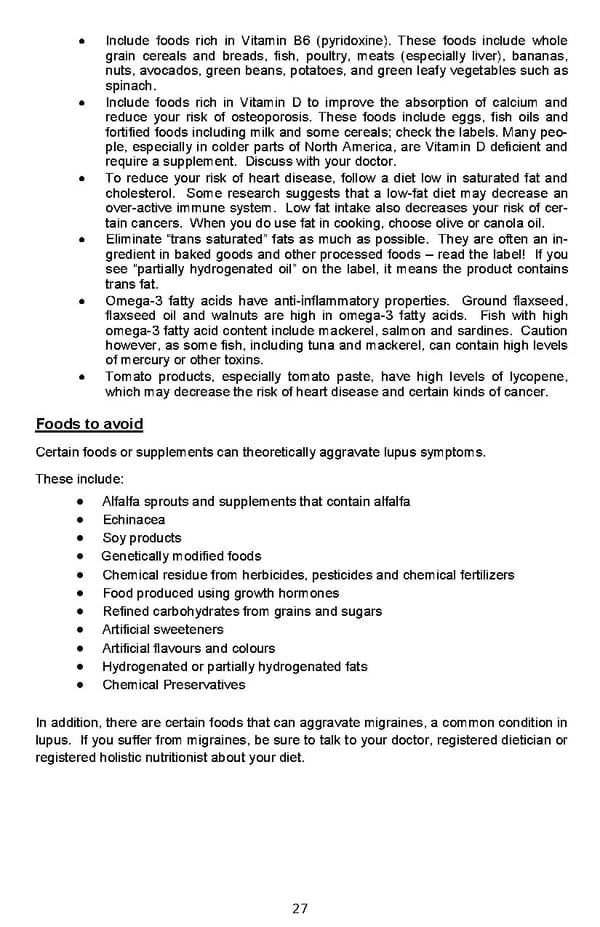• Include foods rich in Vitamin B6 (pyridoxine). These foods include whole grain cereals and breads, fish, poultry, meats (especially liver), bananas, nuts, avocados, green beans, potatoes, and green leafy vegetables such as spinach. • Include foods rich in Vitamin D to improve the absorption of calcium and reduce your risk of osteoporosis. These foods include eggs, fish oils and fortified foods including milk and some cereals; check the labels. Many peo- ple, especially in colder parts of North America, are Vitamin D deficient and require a supplement. Discuss with your doctor. • To reduce your risk of heart disease, follow a diet low in saturated fat and cholesterol. Some research suggests that a low-fat diet may decrease an over-active immune system. Low fat intake also decreases your risk of cer- tain cancers. When you do use fat in cooking, choose olive or canola oil. • Eliminate “trans saturated” fats as much as possible. They are often an in- gredient in baked goods and other processed foods – read the label! If you see “partially hydrogenated oil” on the label, it means the product contains trans fat. • Omega-3 fatty acids have anti-inflammatory properties. Ground flaxseed, flaxseed oil and walnuts are high in omega-3 fatty acids. Fish with high omega-3 fatty acid content include mackerel, salmon and sardines. Caution however, as some fish, including tuna and mackerel, can contain high levels of mercury or other toxins. • Tomato products, especially tomato paste, have high levels of lycopene, which may decrease the risk of heart disease and certain kinds of cancer. Foods to avoid Certain foods or supplements can theoretically aggravate lupus symptoms. These include: • Alfalfa sprouts and supplements that contain alfalfa • Echinacea • Soy products • Genetically modified foods • Chemical residue from herbicides, pesticides and chemical fertilizers • Food produced using growth hormones • Refined carbohydrates from grains and sugars • Artificial sweeteners • Artificial flavours and colours • Hydrogenated or partially hydrogenated fats • Chemical Preservatives In addition, there are certain foods that can aggravate migraines, a common condition in lupus. If you suffer from migraines, be sure to talk to your doctor, registered dietician or registered holistic nutritionist about your diet. 27
 Living Well With Lupus Facts Booklet Page 26 Page 28
Living Well With Lupus Facts Booklet Page 26 Page 28